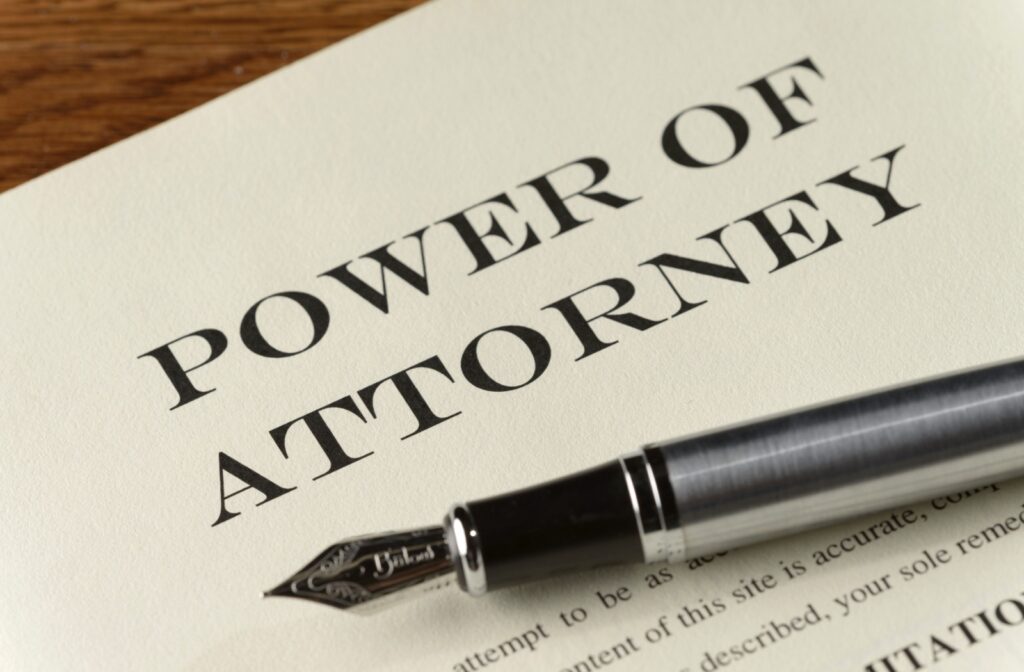A diagnosis of dementia raises important questions about legal matters. One of the most common concerns is whether someone with dementia can still sign legal documents like wills, power of attorney, or healthcare directives.
Someone with dementia can still sign legal documents as long as they are deemed mentally competent at the time of signing. This means they must have the capacity to understand the nature and consequences of their actions, including the contents of the document they are signing.
However, dementia affects each person differently, and as the disease progresses, an individual’s mental capacity can decline. While they may have been competent to sign a legal document at one point, they may no longer be able to do so later.
What Is Dementia?
Dementia is a term used to describe a group of symptoms that affect a person’s thinking, memory, and reasoning—it’s not a normal part of aging.
Several diseases can cause dementia, with Alzheimer’s disease being the most common. These conditions cause changes in the brain that can impact a person’s ability to:
- Recall important information
- Solve problems effectively
- Make sound decisions
- Communicate clearly
- Manage emotions
The severity of these symptoms can vary depending on the type and stage of dementia. Dementia is a progressive condition that worsens over time. Individuals with dementia may eventually become unable to take care of themselves or make important decisions, including the ability to sign legal documents.
Not everyone with dementia will experience all of these symptoms. Additionally, some people may experience different symptoms at different stages of their disease. It’s crucial to work closely with medical professionals and legal advisors when dealing with a loved one who has dementia, as there are often complex legal implications involved.
How Does Dementia Affect Your Judgment?
Dementia is caused by damage to brain cells, which affects cognitive functions such as thinking, reasoning, and judgment. As a result, individuals with dementia may have difficulty:
- Understanding complex situations.
- Assessing risks and the consequences of their choices.
- Making decisions and prioritizing needs, focusing on immediate needs or wants rather than long-term well-being.
As a result, they may struggle to make proper decisions, particularly in complex matters like legal paperwork. This is why early planning and involving trusted family members in the decision-making process can be very helpful.
Does Dementia Affect Legal Capacity?
Legal capacity refers to a person’s ability to understand the consequences of their actions and make sound decisions. With dementia, this ability can change over time.
If your loved one is diagnosed with dementia, your first step should be to visit a healthcare professional. Choose a provider specializing in treating seniors, like a geriatrician or a neuropsychologist, because they’ll have a unique, in-depth understanding of what to look for. They’ll assess to determine your loved one’s:
- Communication skills
- Understanding
- Capacity to interpret complex information
- Ability to remember details
- Perception of personal safety
- Decision-making capabilities
If this assessment finds that your loved one can make legal decisions, you don’t need to do much else. However, if it determines your loved one should no longer be making legal decisions for themselves, you should start looking into other avenues, like a power of attorney.

What Is Power of Attorney?
Power of attorney, or POA, is a legal document that allows someone else to make decisions on behalf of another person, including financial, medical, and personal decisions. Someone trustworthy must be selected for this role, as they will have significant control over the affairs.
This person is called the agent. The principal grants legal authority to the agent to handle their affairs. The principal retains the right to revoke the POA at any time.
Generally, the agent can make legal decisions related to:
- Financial affairs: The agent can handle the principal’s money, bills, and investments.
- Medical decisions: The agent can make decisions relating to the principal’s healthcare, including treatments, choosing healthcare providers, and helping with end-of-life decisions.
- Estate management: The agent is authorized to manage the principal’s estate, including selling assets, paying debts, distributing property, and executing the will.
- Legal matters: The agent is responsible for handling most, if not all, legal situations that develop, such as filing lawsuits or hiring a lawyer to represent the principal.
The assigned agent is legally required to act in the principal’s best interests. If the agent fails to fulfill their duties or acts inappropriately regarding the POA, they can be held legally responsible for any indiscretions.
When to Consider Power of Attorney
A POA can provide peace of mind for both you and your loved one diagnosed with dementia. It’s important to be proactive when considering a power of attorney. The ideal time to discuss this with your loved one is when they are still in the earliest stages of dementia so they can participate in the conversation, communicate their wishes, and set restrictions while they are still legally capable of making their own decisions.
Remember, for a POA to be valid, the principal must fully understand the document they’re signing. Proactively setting up a POA while your loved one can still make sound decisions is crucial to ensuring their well-being and honoring their wishes in the future.
Preparing for the Future
At Somerby Sandy Springs, we understand the unique needs of individuals with dementia. We’re a Lilac Trace Memory Care neighborhood and offer a supportive and compassionate environment where residents can thrive.
Our philosophy is simple: to meet every resident right where they are in their individual journeys. This loving approach celebrates their past, brings dignity to the present, and inspires hope for the future. Our memory care lifestyle is led by Certified Dementia Practitioners (CDPs) who are experts in creating a secure and enriching environment.
If your loved one has been diagnosed with dementia, contact our community today. We’ll happily answer your questions and help your family find a place where your loved one can feel right at home.











